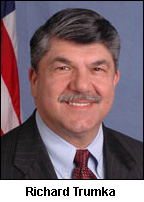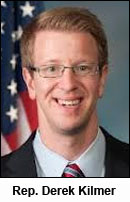NATIONAL
State’s Dems split on exempting tribal businesses from labor law
 WASHINGTON, D.C. (Nov. 19, 2015) — The U.S. House of Representatives on Tuesday passed the “Tribal Labor Sovereignty Act” (H.R. 511), legislation opposed by the AFL-CIO that strips National Labor Relations Act (NLRA) protections from more than 600,000 workers at tribal enterprises on tribal lands.
WASHINGTON, D.C. (Nov. 19, 2015) — The U.S. House of Representatives on Tuesday passed the “Tribal Labor Sovereignty Act” (H.R. 511), legislation opposed by the AFL-CIO that strips National Labor Relations Act (NLRA) protections from more than 600,000 workers at tribal enterprises on tribal lands.
In the 249-177 vote, Washington Reps. Suzan DelBene, Denny Heck and Derek Kilmer were among the 24 House Democrats who sided with majority Republicans — including all GOP members from Washington — in voting “yes.” Democratic Reps. Rick Larsen, Jim McDermott and Adam Smith voted against H.R. 511.
 “Make no mistake, this legislation is a veiled attempt to silence the voices of working people,” said AFL-CIO President Richard Trumka. “The AFL-CIO believes in both tribal sovereignty and worker solidarity. We don’t have to choose. The Senate should reject this union-busting bill in its entirety.”
“Make no mistake, this legislation is a veiled attempt to silence the voices of working people,” said AFL-CIO President Richard Trumka. “The AFL-CIO believes in both tribal sovereignty and worker solidarity. We don’t have to choose. The Senate should reject this union-busting bill in its entirety.”
The bill, introduced by Rep. Todd Rokita (R-Ind.) and opposed by the Obama administration, seeks to overturn a decision by the National Labor Relations Board (NLRB), which applied the NLRA to the San Manuel Indian Bingo and Casino, a tribal casino enterprise. The board concluded that applying the NLRA would not interfere with the tribe’s autonomy, and the effects of the NLRA would not “extend beyond the tribe’s business enterprise and regulate intramural matters.”
Rep. Bobby Scott (D-Va.), the ranking Democrat on the Education and the Workforce Committee, defended the NLRB’s jurisdiction on the House floor before the vote, saying that approximately 75 percent of the 600,000 workers in tribal businesses are not themselves members of Indian tribes. He argued H.R. 511 simply chose “sovereignty for some over the rights of others.”
 Rep. DelBene said concerns about protecting tribal sovereignty led her to vote for the bill.
Rep. DelBene said concerns about protecting tribal sovereignty led her to vote for the bill.
“My record on workers’ rights is clear — I have been a staunch supporter of collective bargaining rights, the National Labor Relations Act, Project Labor Agreements and ensuring all workers earn a living wage,” DelBene said. “But this bill was about tribal sovereignty. I believe our laws can respect tribes and support middle-class workers. That being said, tribal nations should take great care in forming compacts to operate their own casinos on tribal lands that encompass pro-worker labor policies.”
 Rep. Heck emphasized that workers could still organize unions under H.R. 511
Rep. Heck emphasized that workers could still organize unions under H.R. 511
“I believe strongly in tribal sovereignty and workers’ rights, and know they do not have to be mutually exclusive,” Heck said. “My vote puts the right to organize in the hands of the tribal government employees, similar to how it is for federal, state and local government employees who are also not subject to the National Labor Relations Act.”
 “Going back 70 years, municipal, county and tribal governments have been able to choose whether to partner with local unions,” Rep. Kilmer said. “The bill we voted on respects that precedent and most importantly, our obligation to honor tribal sovereignty. As Chris Winters with the International Union of Painters and Allied Trades District 5 wrote to me, ‘There is and does exist here in the Pacific Northwest a mutual respect shown by the tribes and labor who collectively work to protect working families. I encourage you to vote for sovereignty.’ Should this bill become law, tribal governments would still have the opportunity to have their workforce represented by local unions.”
“Going back 70 years, municipal, county and tribal governments have been able to choose whether to partner with local unions,” Rep. Kilmer said. “The bill we voted on respects that precedent and most importantly, our obligation to honor tribal sovereignty. As Chris Winters with the International Union of Painters and Allied Trades District 5 wrote to me, ‘There is and does exist here in the Pacific Northwest a mutual respect shown by the tribes and labor who collectively work to protect working families. I encourage you to vote for sovereignty.’ Should this bill become law, tribal governments would still have the opportunity to have their workforce represented by local unions.”
In a letter to members of Congress urging their opposition to H.R. 511, the AFL-CIO said it “does support the principle of sovereignty for tribal governments, but does not believe this principle should be used to deny workers their collective bargaining rights and freedom of association. While the AFL-CIO continues to support the concept of tribal sovereignty in truly internal, self-governance matters, it is in no position to repudiate fundamental human rights that belong to every worker in every nation.” The letter adds:
Notwithstanding the importance of the principle of tribal sovereignty, the fundamental human rights of employees are not the exclusive concern of tribal enterprises or tribal governments. In fact, the vast majority of employees of these commercial enterprises, such as the casinos, are not Native Americans. They therefore have no voice in setting tribal policy, and no recourse to tribal governments for the protection of their rights.
The Senate companion bill, S. 248 sponsored by Sen. Jerry Moran (R) and 13 other Republicans, passed the Senate Indian Affairs Committee in June but no date has been set for consideration of the bill by the full Senate.





